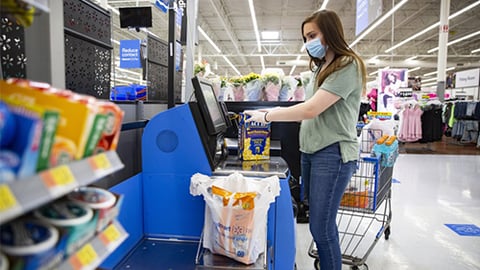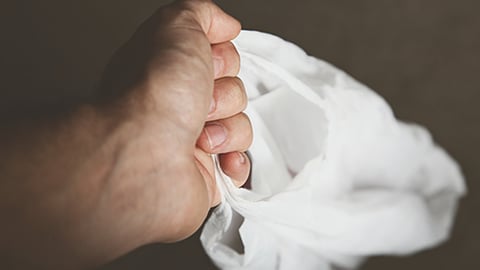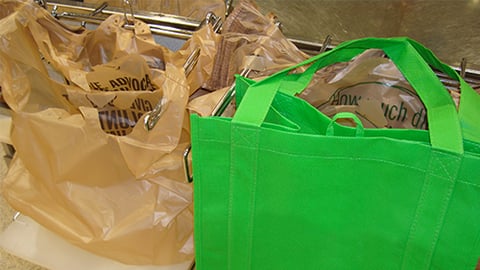Albertsons Takes Steps to Reinvent Single-Use Plastic Bags
Adding to its current efforts to reduce waste, Albertsons Cos. has now also joined the Beyond the Bag Initiative to replace single-use retail plastic bags.
Beyond the Bag, launched by the Consortium to Reinvent the Retail Bag, is a multiyear collaboration across retail sectors that aims to identify, test and implement innovative design solutions that serve the function of today’s single-use plastic retail bag, delivering ease and convenience for consumers while striving to lessen the impact on the environment.
“Albertsons Cos. has a passion for innovation and shares Beyond the Bag’s vision of reinventing the single-use retail bag,” said Suzanne Long, the grocer's group VP of strategic sourcing and environmental, social and governance. “Ensuring our products are better for our communities and the planet is a priority for us. We look forward to working with the Beyond the Bag Initiative to help create a more sustainable future.”
The initiative has several foundational goals:
- Reduce the use of virgin materials from natural resources and greenhouse gases emitted from the production and recovery of bag solutions.
- Identify and scale innovative design solutions to create a system that serves the function of the current retail bag.
- Increase the percentage of retail bags diverted from landfills.
- Inspire and engage people to imagine new possibilities for the retail bag system.
Closed Loop Partners’ Center for the Circular Economy launched the Consortium and its Beyond the Bag Initiative in early 2020. The consortium includes the three founding partners CVS Health, Target and Walmart, as well as Kroger, Dick’s Sporting Goods, Hy-Vee, Meijer and Walgreens. In addition to retailers, the consortium includes environmental advisory partners and third-party experts.
“It’s time for us to think beyond the status quo and reinvent the ubiquitous retail bag for a more sustainable future,” said Kate Daly, managing director of the Center for the Circular Economy at New York-based Closed Loop Partners. “We’re thrilled to welcome Albertsons Cos. into this consortium of leading retailers. Together, we can create impact at scale and tackle the challenge of plastic bag waste that spans companies and sectors.”
Last summer, the consortium launched a global innovation challenge to identify solutions to replace the current plastic bag, inviting entrepreneurs, designers, suppliers and problem-solvers to submit solutions. The consortium expects to reveal the winning concepts in February. Eligible winners will receive funding and assistance in scaling, and gain access to testing and potential piloting opportunities.
Throughout the next few years, Albertsons will continue to work on its own initiatives as well as collaborate with consortium partners to provide solutions for how to transport groceries home in a way that's both convenient for customers and more sustainable for the environment. Additional plastic reduction efforts already underway at Albertsons include:
- Plastics and Packaging Pledge: Unveiled in April 2019, the pledge is intended to advance sustainability and reduce plastic waste throughout the company and its banners, starting with its operations and its Own Brands portfolio. Among the commitments is a pledge to ensure 100% of its Own Brands packaging is recyclable, reusable or industrially compostable by 2025.
- Reusable bags made with recycled bags and plastic film: Select stores offer reusable shopping bags that are produced through a closed-loop process that produces bags made from 65% recycled material, including a minimum of 40% post-consumer waste.
- Reusable bags made from ocean-bound plastic: The retailer’s Southern California stores offer bags made with up to 90% post-consumer plastics that would otherwise end up in oceans and waterways.
- Efforts to reduce single-use bags: Albertsons is proactively working to decrease double-bagging and increasing the number of items in each bag while still protecting the groceries inside the bag. The plastic bags come with a printed reminder to recycle bags; many stores offer drop-off bins for single-use plastic bins to help customers recycle their bags.
While the onset of the COVID-19 pandemic pushed pause on initiatives geared toward reducing single-use plastic, some states are taking steps to get back on track to finding more sustainable solutions. For example, in November 2020, New Jersey Gov. Phil Murphy signed into law S-864, which phases out both plastic and paper disposable bags and polystyrene foodservice items, and provides for plastic straws only upon request. The state's bag ban is expected to take effect in 2022.
Boise, Idaho-based Albertsons operates 2,252 retail stores with 1,725 pharmacies, 398 associated fuel centers, 22 dedicated distribution centers and 20 manufacturing facilities. The company’s stores predominantly operate under the banners Albertsons, Safeway, Vons, Pavilions, Randalls, Tom Thumb, Carrs, Jewel-Osco, Acme, Shaw’s, Star Market, United Supermarkets, Market Street and Haggen. The company is No. 8 on The PG 100, Progressive Grocer’s 2020 list of the top food and consumables retailers in North America. Walmart U.S., Kroger, Walgreens, CVS, Target, Meijer, Hy-Vee are Nos. 1, 3, 4, 6, 7, 19 and 33 on PG's list.






